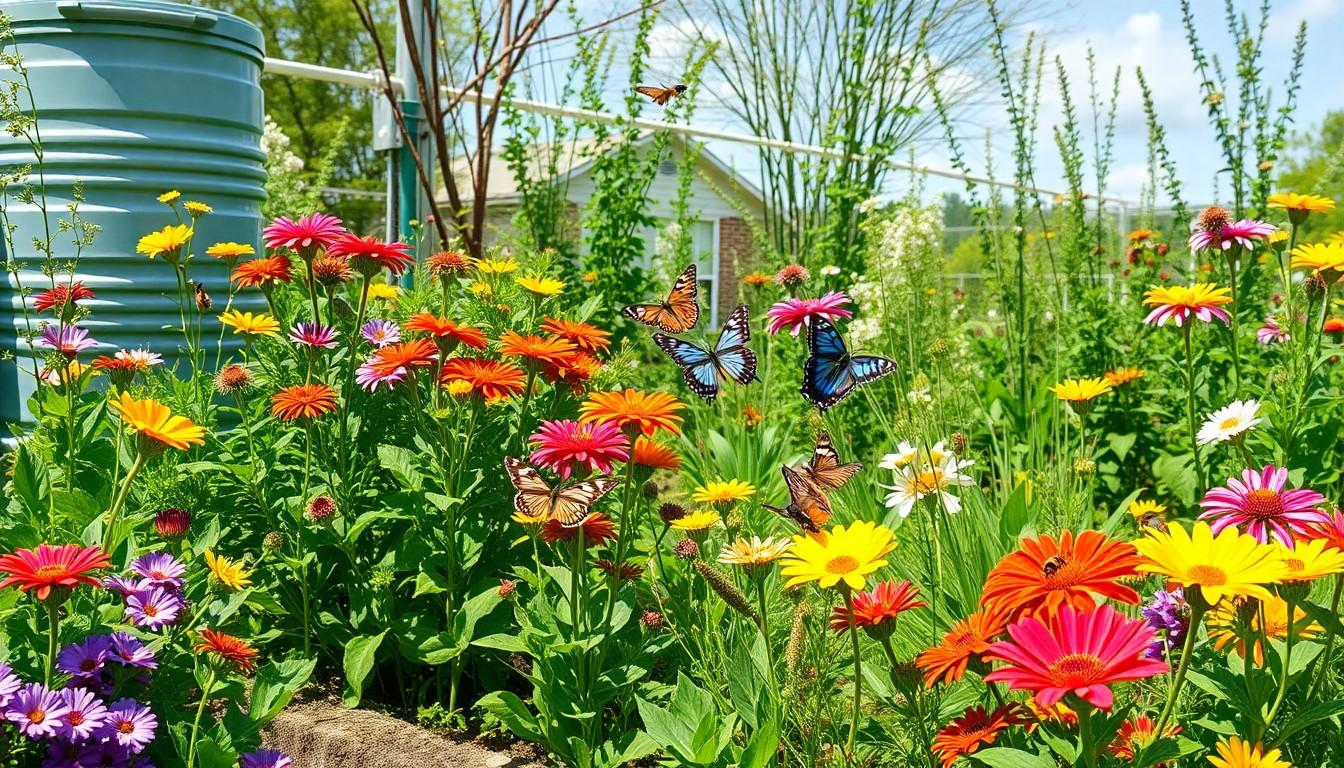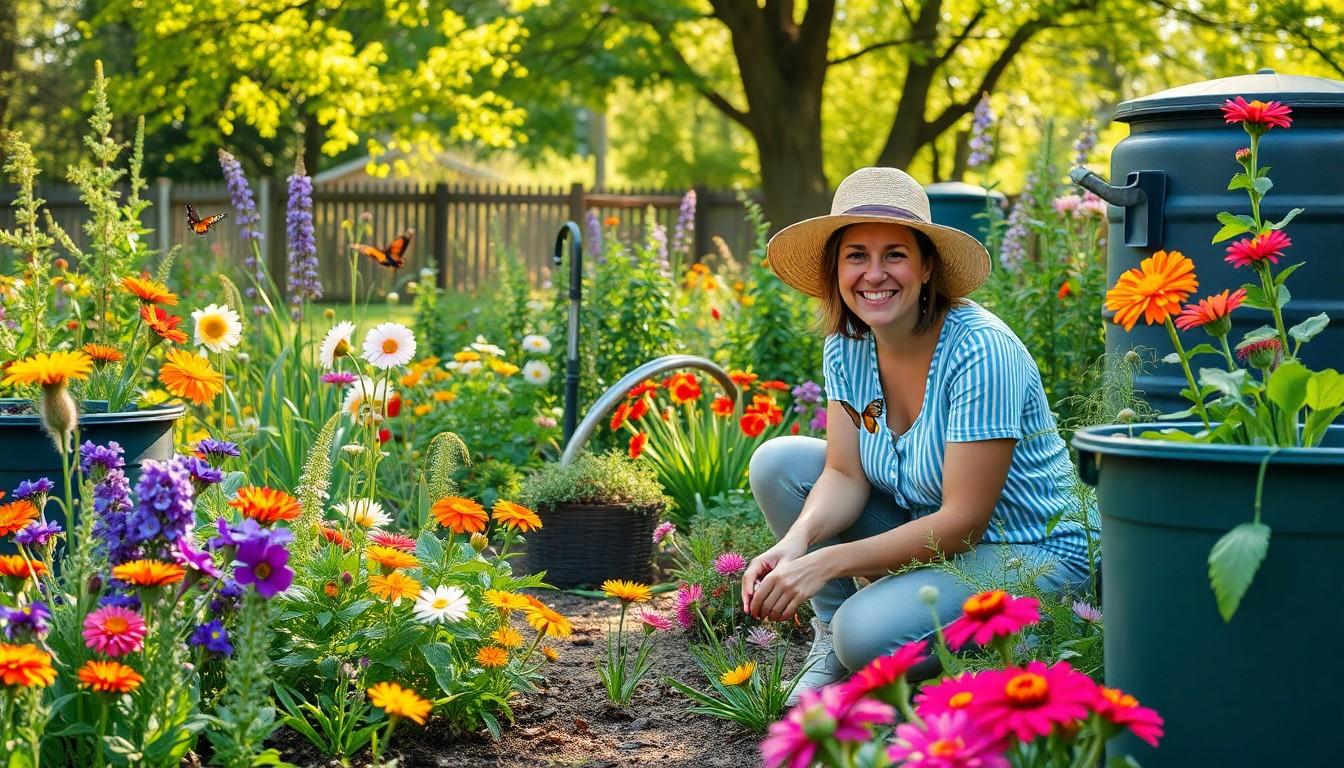As spring bursts onto the scene, so does the perfect opportunity to transform outdoor spaces into eco-friendly paradises. Imagine a garden that not only looks stunning but also helps the planet. It’s like giving Mother Nature a high-five while sipping on a green smoothie.
Eco-Friendly Landscaping Spring
Eco-friendly landscaping offers significant advantages during spring, enhancing outdoor spaces while promoting sustainability. This approach not only beautifies gardens, but it also fosters a deeper connection with nature.
Enhancing Biodiversity
Diverse plant selections attract various pollinators, including bees, butterflies, and birds. Planting native species stimulates local ecosystems, supporting insect populations and wildlife. A healthy garden creates habitats for beneficial creatures, providing crucial balance within the environment. Local flora thrives better in their native soil, resulting in less maintenance and lower water usage. Different plants flowering at varying times offer continuous food sources for pollinators, enhancing ecological resilience.
Reducing Environmental Impact
Sustainable landscaping practices significantly lower carbon footprints. Techniques such as composting recycle organic waste, thus reducing landfill contributions. Rain gardens capture stormwater, which prevents runoff pollution and replenishes groundwater. Implementing xeriscaping conserves water by using drought-resistant plants that require minimal irrigation. Organic fertilizers promote soil health while avoiding harmful chemicals. Together, these methods contribute to cleaner air and water, supporting a healthier planet for future generations.
Key Practices for Eco-Friendly Landscaping

Practicing eco-friendly landscaping enhances outdoor spaces while promoting environmental health. Several key methods contribute to this sustainable approach.
Native Plant Selection
Choosing native plants offers many benefits. Native species thrive in their local ecosystems, requiring less water and maintenance. They attract beneficial insects, such as bees and butterflies, which support pollination. Additionally, native plants help prevent soil erosion and enhance biodiversity by providing habitats for local wildlife. Landscaping with these plants fosters a resilient garden that adapts to seasonal changes effectively.
Water Conservation Techniques
Implementing water conservation techniques significantly impacts sustainability. Rain barrels collect rainwater for future use, reducing dependency on municipal supplies. Drip irrigation delivers water directly to plant roots, minimizing waste. Grouping plants with similar watering needs further conserves resources. Mulching gardens retains moisture, reducing evaporation. These methods not only lower water bills but also protect local water sources from runoff and contamination.
Sustainable Materials for Landscaping
Sustainable materials play a crucial role in eco-friendly landscaping. Choosing the right materials enhances outdoor aesthetics while minimizing environmental impact.
Organic Mulch Options
Organic mulch options improve soil health and conserve moisture. Wood chips support moisture retention and provide nutrients as they decompose. Straw serves as an effective alternative; it decomposes quickly and adds organic matter. Grass clippings also make a great mulch, suppressing weeds and boosting soil fertility. Bark mulch offers longevity, resisting erosion while also maintaining soil temperature. Selecting these materials helps create a thriving ecosystem in gardens, supporting plant health.
Recycled Materials for Hardscaping
Recycled materials for hardscaping reduce waste and promote sustainability. Reclaimed bricks create pathways and patios with character while minimizing environmental damage. Crushed concrete functions well as a base material, offering durability and stability. Using repurposed wood for raised garden beds adds charm and conserves resources. Additionally, recycled glass can enhance aesthetic appeal in landscapes, creating colorful accents. Prioritizing these options leads to beautiful and sustainable outdoor spaces.
Seasonal Tips for Spring Implementation
Spring offers a prime opportunity for implementing eco-friendly landscaping practices. The following strategies enhance garden sustainability and promote a healthier environment.
Planning Your Eco-Friendly Garden
Start by selecting native plants that thrive in the local environment. Choosing species suited to the area reduces water usage and maintenance efforts. Consider the garden’s layout to maximize sunlight and promote airflow. Incorporate companion planting techniques, where compatible plants benefit each other and deter pests. Engaging local nurseries for high-quality native plants ensures a thriving garden. Lastly, plan for seasonal changes in the garden and incorporate elements that support wildlife, such as birdhouses or bee hotels.
Maintenance Strategies for Spring
Establishing regular maintenance routines helps in sustaining eco-friendly gardens. Focus on mulching beds to retain moisture while suppressing weeds. Watering during the cooler parts of the day minimizes evaporation and conserves water. To promote healthy soil, apply organic compost to nourish plants. Monitor for pests and diseases to address issues early, using natural remedies when possible. Implementing drip irrigation systems efficiently delivers water directly where it’s needed. Additionally, encourage biodiversity through planting various species to create a balanced ecosystem that supports native wildlife.
Nurturing the Environment
Embracing eco-friendly landscaping this spring offers a unique opportunity to transform outdoor spaces into vibrant ecosystems. By choosing native plants and implementing sustainable practices, individuals can create gardens that not only enhance beauty but also support local wildlife. The use of water conservation techniques and organic materials further strengthens the connection between gardening and environmental stewardship.
As spring unfolds, it’s the perfect time to cultivate a greener future. Each small step taken in eco-friendly landscaping contributes to a healthier planet. With thoughtful planning and maintenance, anyone can enjoy the rewards of a sustainable garden that thrives while nurturing the environment.

